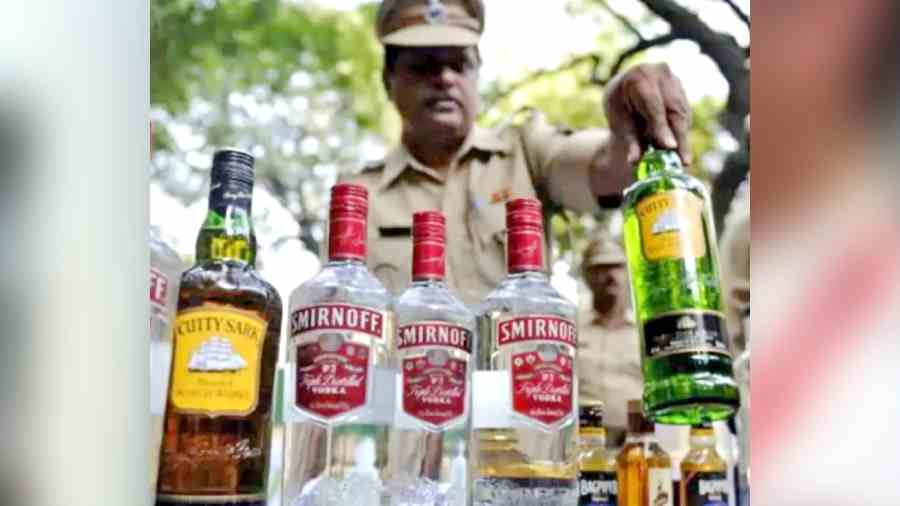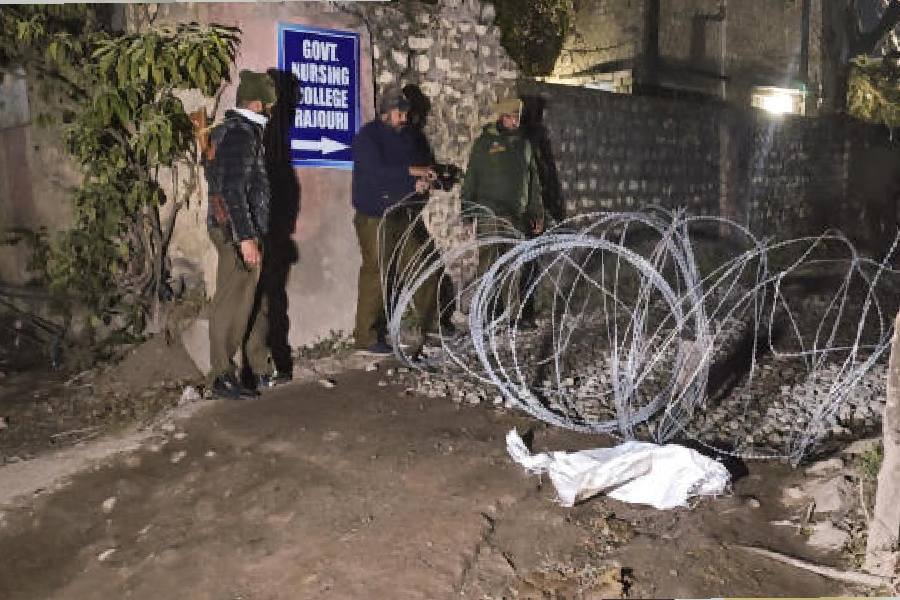I n excess of 70 persons, nearly all from the lower working and social order, died after consuming methyl alcohol in three Bihar districts in mid-December. It was by far the cruellest hit hooch had scored since prohibition was imposed in April 2016, but it wasn’t the first and is unlikely to be the last. It’s probably a sustainable description to call methyl alcohol a chemical cousin of ethyl alcohol, which is what gives some beverages the buzz. Methyl alcohol mimics the whiff of its cousin, but it moves swiftly beyond the effects of the bar-room kick; it kills. Very soon after it has blinded and paralysed. How’s the lay nose, already swayed by the prospect of intoxication, to tell methyl from ethyl?
Nobody has been able to explain better, or more succinctly, the result of such a lapse than the Bihar chief minister and our most zealous prohibition impresario, Nitish Kumar: Jo piyega woh marega, who drinks will die. But surely there’s something else between cause and consequence so coldly concluded, surely a thing or two not so wanting in warmth at wanton death. Surely a word of sympathy from a leader who professes his politics in the name of the lesser, surely from a leader who pays obeisance to Ram Manohar Lohia, who was so wary of the powers of the State over the citizenry that he even held a police baton charge illegitimate. Surely from the avowed disciple of Lohia, a word of consolation for the dead, if not of remorse or even regret. Surely the ownership of some liability for the ghastly deaths on your watch? How does it happen that killer booze is able to breach the elaborate and punitive restrictions doggedly imposed by the chief minister, take its toll and evaporate? Who minds the gates? Who wields the law? Who directs its agents? Jo piyega woh marega; yes, you consume poison, you will die. But who is also responsible? Where did the poison come from? Who made it available? What profits were made off it? Who profited? What of jo pilaayega, the one who provides? This is not another among the many and settled arguments on the futility — indeed, counter-productivity — of outlawing liquor; consider this an argument against a deeply derelict and duplicitous State.
The most secure places to uncork the spirits and have a tipple in Bihar are, well, the most secure places. The kind of places that have daintily painted perimeter walls. The kind of places that are islanded in the sprawl of lawns and shaded groves and, very often, vegetable gardens. The kind of places you may not enter without passing a sentry-post ridden always with a languid sentry or two. They keep such places safe. Secure. If you’re familiar with the lay of imperial-era west Patna, you’d have got the drift; it’s where Bihar’s magisterial authority resides — ministers, incumbent or bygone or in wait, political daddies and their menageries, bureaucrats, lesser babus, policemen. Together, this lot constitutes what might be called the authority of the law. You don’t get to tell them what the law is. They are the law.
And so it is that the most regular and facile violation of what is arguably the strictest law in Bihar comes to be enacted on the precincts of some of those that make, maintain and manifest the law. There’s an old Bihari adage that, roughly paraphrased, goes: if thieve you must, keep the daroga for company.
It’s criminal to imbibe alcohol in Bihar, an offence punishable, since April 2016, by up to a 10-year prison sentence, in some cases, even life. But an offence becomes a crime only when you’re caught. Or, as in the case of the December tragedy, when you’re dead. Jo piyega woh marega, no tears, no compensation.
At the first drop of the guillotine on alcohol, Bihar ran about headless trying to find ways to feed a habit that had been suddenly proscribed with scary punishments attached. It drove to Jhumritilaiya, the first township across the border in Jharkhand, to find a vend. It jumped on a train headed west to UP and jumped off it at the first sight of a shack that offered the spirits. It ran east into Bengal to look for watering holes. It crossed the international border and found places in Nepal. What it consumed in small measures over a leisurely week, it glugged down over a hurried afternoon’s or weekend’s outing. It went out thirsty; it returned sloshed. Nitish had nailed the bottle; Bihar hammered itself.
Barely anybody that feels like a drink in the state isn’t able to find it. The drink comes dearer, and must be had furtively — afraid they might be reported, drinking friends do not admit to drinking friends they drink — but it is there to be had. It comes easier in the countryside, delivered home by dark and had in the backyard.
On paper, Nitish’s bar on alcohol has served up heady numbers — scores of lakhs of litres of what is now contraband seized — premium whiskeys, beer, country liquor, Indian-made foreign liquor, mahua, hadia, toddy, narangi, whatever not. But the truth would likely bring that feat a few pegs down. And the truth is this: for every litre of alcohol seized, five, probably even ten, slip through, or are allowed to slip through. Alcohol is big money in today’s Bihar and it has found its Al Capones. There’s a market, and there’s an organised machinery to feed it and feed off it. Liquor-running is the quickest way to get rich; if you are willing to take the risk, profit per bottle can go as high as 120%. A few monsoons ago, it rained so hard and long that Patna’s drains got clogged; to clear them was to discover thousands of emptied liquor bottles. None of the harvest would have been possible without the connivance of the euphemism called ‘the system’.
Not long ago, substantive quantities of alcohol confiscated and kept in police holds in Patna were found to be suddenly missing, as if they had evaporated. Special delivery to those secure west Patna homes with sentry posts? Questions were raised and an answer was duly furnished: rats, the police officer in charge offered blithely, had partied on it. Patna rats have good taste; they had polished off the cream of the prize catch.
No wonder drunkard rats haven’t been reported dead from Bihar. It’s only Biharis who die like them.
sankarshan.thakur@abp.in










